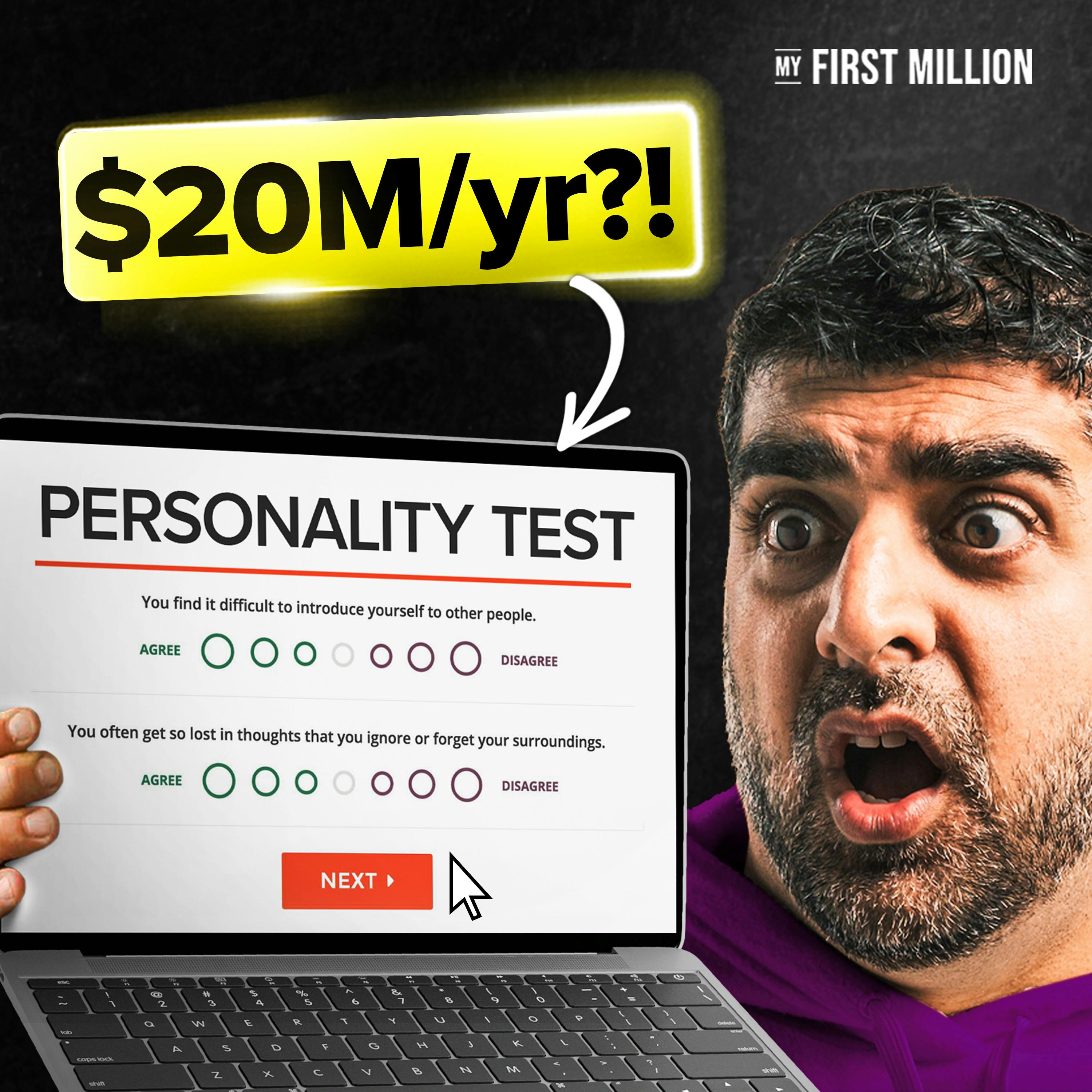
March 15, 2024 • 56min
We Tested Our Grit (And Were Humbled Immediately)
My First Million

Key Takeaways
- The Myers-Briggs Type Indicator personality test, used by 89% of Fortune 100 companies, is not scientifically valid and can produce inconsistent results
- Angela Duckworth's "grit scale" is a simplistic self-assessment of passion and perseverance, with questionable predictive power
- Reinventing yourself by "walking backwards" to take on new challenges is a hallmark of highly successful entrepreneurs like Elon Musk, even if it means risking failure
- "Speedrunning" by mastering and replicating a proven playbook in business can also lead to rapid success, as shown by e-commerce founders who launched second acts in record time
- The founder of RxBar, which sold for $600M, has launched a new bar company called David after getting bored in retirement - an example of "speedrunning" success
Introduction
In this wide-ranging episode, Shaan Puri and Sam Parr discuss the validity of popular personality tests, the role of grit in success, and two contrasting approaches used by entrepreneurs - "walking backwards" to tackle new challenges versus "speedrunning" by replicating past success. They also dive into the story behind the meteoric rise and $600M sale of the RxBar company.
Topics Discussed
The Myers-Briggs Personality Test (7:54)
- Developed in the 1940s by a mother-daughter team, Isabel Briggs Myers and her mother Katharine, after reading about personality typing in Reader's Digest
- Sorts people into 16 personality types based on preferences like thinking vs. feeling, perceiving vs. judging
- Used by 89% of Fortune 100 companies and 200 federal agencies
- Monetized through a multi-level model - individuals pay $15-40 to take the test, administered by certified practitioners who pay $2000 to get certified
- Estimated to generate over $20M/year, but actual financials are private
- Criticized as pseudoscience that relies on the Barnum effect - general descriptions that seem personally relevant
- "About 50% of people will end up with a completely different label if retested weeks later" - Shaan Puri
Angela Duckworth's Grit Scale (14:50)
- Developed by psychologist Angela Duckworth, author of the book "Grit"
- Measures "passion and perseverance," calculated by answers to 10 questions like "I often set a goal but later choose to pursue a different one"
- Shaan scores a 2.5/5, putting him in the bottom 10th percentile of grit; Sam scores a 3.5/5, higher than 40% of test takers
- Shaan criticizes the test as "nothing" - simplistic questions that rely on self-assessment
- Despite popularity with business leaders, the actual scientific evidence for grit is limited
Reinvention vs. Speedrunning in Entrepreneurship (37:02)
Gary Vaynerchuk believes the most successful entrepreneurs have a "willingness to walk backwards" - to become a beginner again and take on entirely new challenges:
- Elon Musk went from software (Zip2, PayPal) to rockets & electric cars
- Risked his entire PayPal fortune to fund SpaceX and Tesla, which both nearly went bankrupt
- "The great entrepreneurs reinvent themselves - they go into new fields, new studies, new beginnings, and start again" - Naval Ravikant
In contrast, other highly successful founders choose to "speedrun" by mastering a playbook and replicating it:
- Shaan shares examples of 3 e-commerce entrepreneurs who sold companies for 9-figures, then rapidly launched and scaled new companies in the same space
- One founder bet he could hit $1M/month revenue within 3 months of launching, and succeeded
- Another was motivated by a chip on his shoulder after visiting an incumbent's offices
- While less celebrated than reinvention, speedrunning leads to fast and impressive results
The RxBar Story (50:58)
- Founder Peter Rahal, a CrossFit enthusiast, noticed a lack of Paleo-friendly snacks
- His father told him: "Shut the f**k up and go sell some bars" instead of looking for investors
- Used to academic failure, Peter was comfortable "eating s**t" and persisting through early struggles
- Not raising outside capital forced a relentless focus on sales
- RxBar's revenue growth:
- First 9 months: $600K
- Year 1: $2M
- Year 2: $6M
- Year 3: $36M
- Year 4: $161M, sold to Kellogg's for $600M
- After a few years of boredom in retirement, Peter has now launched a new nutrition bar company called David
Conclusion
This episode offers a skeptical look at the shaky science behind popular personality tests like Myers-Briggs and Angela Duckworth's Grit Scale. While thought-provoking, these frameworks have limited predictive power and rely heavily on subjective self-assessment.
The discussion of reinvention vs. speedrunning provides two contrasting models for serial entrepreneurship. While the "walk backwards" approach of taking on brand new challenges is often celebrated, the "speedrunning" model of replicating and rapidly scaling a proven playbook clearly leads to impressive results.
Finally, the story of RxBar's founding and meteoric growth demonstrates the power of relentless sales, bootstrapping, and persistence through early struggles. The fact that RxBar's founder has now returned to the game with a new bar company shows that the impulse to recreate past success remains strong even after a major exit.
